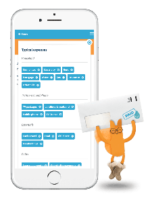May
2023
Financial education: money management for Gen Z
DIY Investor
4 May 2023
Financial education in schools has, by and large, traditionally been pretty poor; however things are improving, and in June teachers in primary and secondary schools ran activities as part of My Money Week to help pupils with their money management and to look after their personal finances – writes Christian Leeming
The initiative, run by the charity Young Enterprise, supports schools in putting more emphasis on financial education, and their work is supported by advances in technology.
Learning how to manage money can be tough, even for a tech-savvy generation born in the age of the mobile and the internet, and many members of Generation Z – those born in the late 90s/early naughties – often leave school woefully unprepared.
Now a wide range of apps and websites are there to engage and assist young people to budget, monitor their spending, or even learn to save or invest for their future. Here are just some of them:
Chip
Chip is a ‘millennial-friendly’ automatic  savings app focused on young people’s greatest challenge – saving Chip connects to the user’s online banking, analyses their spending and calculates how much they can afford to save without having an impact on their day-to-day spending.
savings app focused on young people’s greatest challenge – saving Chip connects to the user’s online banking, analyses their spending and calculates how much they can afford to save without having an impact on their day-to-day spending.
That money is then automatically moved into their Chip savings account; the app communicates through an emoji-obssessed chatbot.
Splitwise
Splitwise allows you to create groups of friends, enter an amount, or regular amounts (for a restaurant bill, a holiday, gig tickets) and the app works out how much each person owes. The free app also sends notifications to remind people to pay and allows you to track balances and expenses.
Young Money Matters
Young Money Matters is the brainchild of LSE economics student Finlay Alcorn who set up the website to encourage young people to save and spend responsibly; it offers sensible advice on things students should know about, but probably don’t, such as budgeting, investing and pensions.
Squirrel
 A money management app that channels your salary into a Squirrel account and sets up various pots — for bills, savings and specific goals. It then releases the rest of your money into your current account for everyday spending and moves the rest when required (e.g.when a bill is due, so you know you can’t spend it before).
A money management app that channels your salary into a Squirrel account and sets up various pots — for bills, savings and specific goals. It then releases the rest of your money into your current account for everyday spending and moves the rest when required (e.g.when a bill is due, so you know you can’t spend it before).
Squirrel costs £9.99 a month, which may sound counter-intuitive but review suggest that it is money well spent in pursuit of the savings habit.
Save the Student
‘From themselves?’ may be the response of a cynic, but this popular website sets out to deliver a comprehensive financial companion for students. It includes vital money lessons you may, or may not have learned in school, and there are sections on finance, banking, making and saving money and great daily retail deals.
Lotty Earns
Blogger Charlotte Burns (lottyearns.co.uk) used to work for Martin Lewis’s Money Saving Expert, and now offers light-hearted financial tips for a generation that wants to look and feel good without spending a fortune. Content ranges from ‘Barbados on a budget’ to why you shouldn’t always trust your bank.
Unidays
Students can put their email address into this app to get deals with leading retailers such as Apple, Asos, Missguided, Deliveroo, Adidas, Bella Italia and Hello Fresh; it also carries videos that allow you to tag in others students, some that have been seen millions of times
See more money management apps here
Tips to empower and support young entrepreneurs here
Soldo is a multi-user expense account that helps companies to manage the entire business expense cycle. It integrates prepaid Mastercard cards, a web-based administration console, and a mobile app into one intuitive future-ready platform. More information here >
Leave a Reply
You must be logged in to post a comment.